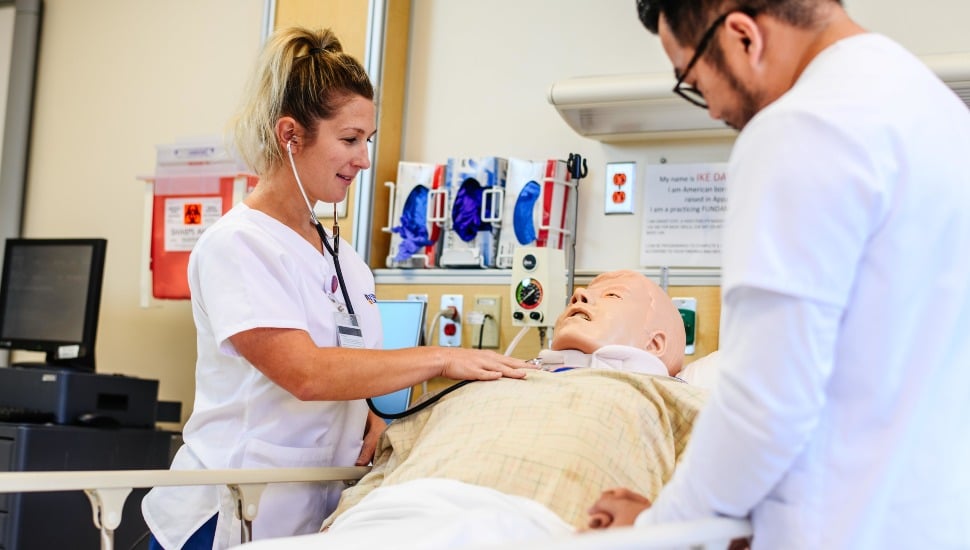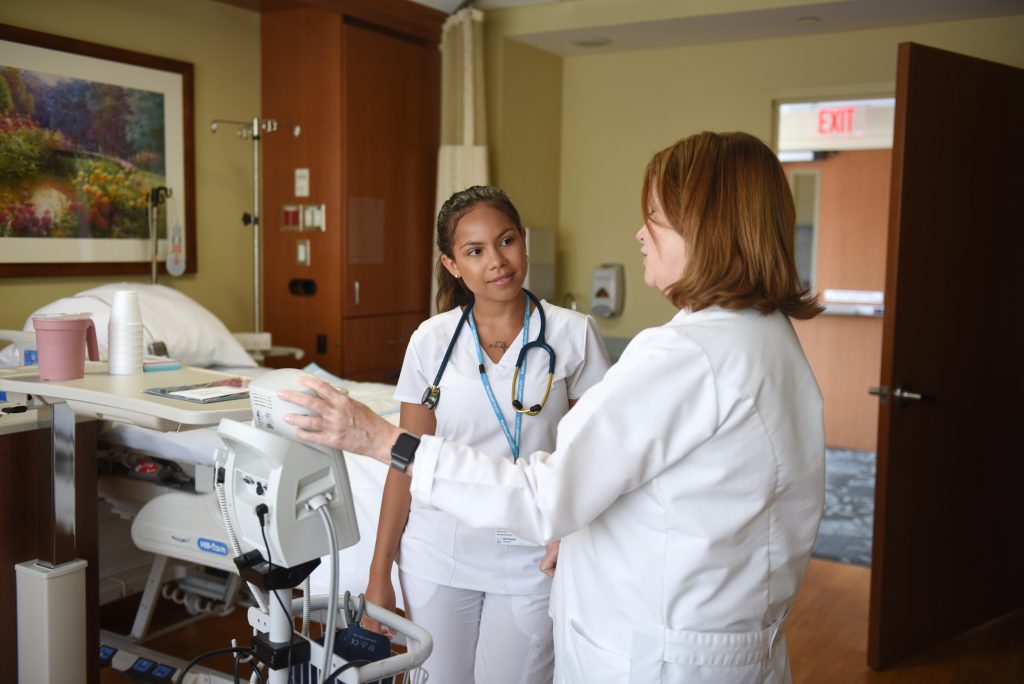How to Pick a Nursing Program
If you are interested in applying to nursing school, you’re probably full of questions: What requirements do you need to meet? What will it cost? Where should you go? There are several key factors to consider when selecting the right program for you.
Not all programs offer the same level of student support, the same program options, or the quality of job placement services. Here, we will explore common nursing program requirements and other factors you should consider to help you pick the right nursing program for your goals and learning style.
Major Requirements of Nursing Programs
The requirements for nursing programs exist to predict and assess whether or not a student will be successful in the program. In many cases, nursing programs will have similar prerequisites. These requirements center around the academic foundation and educational prowess, demonstration of commitment, understanding of terminology, and a broad perspective of math and science.
The particular requirements for a nursing program may differ slightly from another, so you will want to look at all the requirements for the individual nursing programs you are applying for. That said, most programs will have requirements that include the following:
Coursework
Most nursing pathways will require a foundation of prerequisite courses to qualify for admission. The most common courses include the following subjects:
- Anatomy and physiology
- Biology
- Microbiology
- Chemistry
- English composition
- Lifespan and growth development
- Nutrition
- Psychology
- Statistics
These requirements can be satisfied through a pre-nursing program at a university or community college. Most institutions require candidates to complete these courses within five years of applying, although some courses have no expiration date. Check with the admissions team at the school you’re applying to to make sure you meet the requirements.
Grade Point Averages
Typically, nursing schools will require at least a “C” in relevant coursework. The grade point average (GPA) that you will need to be accepted into a nursing program may depend on the type of program you are applying for. For example, an Associate’s Degree in Nursing (ADN) may only require a GPA of 2.5-2.75. On the other hand, a Bachelor of Science in Nursing (BSN) may require a GPA of at least 3.0. The requirements for GPA can also depend on the program or school you are applying to.
For example, some more competitive programs may not accept applicants with a GPA lower than 3.25. Lauren Sciocchetti, Director of Undergraduate Admission at Neumann University shares that, “students should really connect with the programs they are interested in to make sure they know the exact requirements. There could also be specific GPA required for the prerequisite coursework that is different from the overall GPA.”
Standardized Test Scores
Like many other types of undergraduate and graduate programs, many nursing schools no longer require the submission of standardized test scores. However, some nursing schools do still require these scores, so it is important to check with individual programs before applying.
Though many programs do not require these scores, most will consider them if you want to report them. If you have done well on your ACT or SAT, for instance, your scores might even offset weaknesses in your academic records.
“Viterbo University’s undergraduate programs, like most other colleges and universities, are test optional,” says Brian Weber, Assistant Vice President for Enrollment Management at Viterbo University.. “We encourage students that have taken the ACT or SAT to submit their scores. It doesn’t hurt to submit such test scores ahead of applying for admission or as they become available.”
How to Pick the Right Nursing Program: Key Factors to Consider
Alongside the requisites, you should consider how each nursing program performs in the following areas:
Program Delivery
There are three types of program delivery methods: online, on-campus, and hybrid. Many students in school during the past few years have gained experience with online and hybrid course delivery methods. This can help to inform you in your decision of what delivery method will be the best for you.
Jade Mikshowsky, Assistant Professor with the Viterbo University College of Nursing and Health, explains that “Viterbo offers three options for course delivery, online, in-person, and a hybrid model depending on the degree program. Viterbo emphasizes the importance of teaching nursing skills in-person to assure best practice techniques are understood by students.”
There is no right or wrong choice in this area; you must consider which delivery method is most suitable for your learning. Remember that each type of delivery has its challenges and advantages. For example, in an online course, you are typically responsible for staying on top of your work and being accountable for your own organization. “One thing to keep in mind when evaluating an online nursing program is their affiliations with healthcare organizations,” says Mikshowsky. “Many healthcare organizations will not accept students for clinicals unless they have an established partnership with the nursing program. Viterbo prides itself on having established partnerships with nationally ranked health care organizations meaning students get the best training close to campus.”
On the other hand, on-campus programs can be more expensive because they require you either to live on campus or to commute to class. Hybrid options offer the challenge of balancing online and on-campus learning methods which, for some, makes it an ideal balance. It’s all up to your learning style to decide what’s best.
Faculty/Student Relationships and Class Size
Another crucial factor to consider is what the relationships between you and your professors will be like. Programs with very large lecture-style classes are not likely to have well-developed faculty/student relationships. On the other hand, programs with smaller classes make it natural to foster those relationships. Mikshowsky points out that “Viterbo’s classes are kept small so that students and faculty have more opportunities to work 1-on-1. Students also benefit from having nursing faculty as their academic advisors once they enter the professional nursing sequence around their sophomore year.” Typically, the larger the class size, the less meaningful feedback you will get on your work.
Of course, not everyone feels like they need to have a relationship with their professors. Some people prefer to learn more independently without feeling like someone is checking in on them. Other people may get lost and confused without someone they can visit with questions. An essential part of finding the right program for you is understanding your learning style.
Dr. Christi Glesmann, director of undergraduate nursing at the College of Saint Mary in Omaha, Nebraska says, “In addition to the lecture-style classes, programs may have varying ratios for lab and clinical experiences. Lab experiences, conducted within a skills room or simulation center, are hands-on learning activities that require more individual time and feedback. Clinicals, done through simulation and/or a healthcare site, may be done with faculty, adjunct clinical instructors, preceptorships, and so forth. Each of these methods has their own benefits and drawbacks. It is important to ensure a good fit to your learning needs.”
Program Completion
This is the rate in which students complete and graduate from the program on time or within a certain time period. A high program completion rate, coupled with a high NCLEX pass rate (learn more about pass rates below), demonstrates that this is a program that supports students’ success and prepares them to be safe and competent entry-level nurses.
NCLEX First-Time Pass Rates
A program’s pass rate for the National Council Licensure Examination (NCLEX)—or, more specifically, NCLEX-RN (National Council Licensure Examination for Registered Nurses)—is a crucial piece of information to consider. A program whose students have a high first-time pass rate suggests that you will also have similar success.
Program Cost and Available Financial Aid
Just like any other type of education program, there are a variety of nursing programs with a wide range of costs. Some programs are more expensive than others, and some may not offer enough financial aid for you to attend them. Before getting too attached to any single program, take the time to consider whether or not you can afford to attend. Financial information can be challenging to find, but with some research, you should be able to see how much your tuition, housing, and general costs of the program are.
Technology Available for Hands-On Training
Many nursing programs offer hands-on training in local hospitals and doctor’s offices. Keep in mind that online courses may not offer these opportunities or, if they do, they may have partnerships with local healthcare facilities at which you can practice.
The simple truth is that some things are difficult to learn in a classroom setting. Being in the field allows you to learn how things are done and how to conduct yourself in the environment. So, when you are looking for the right nursing program for you, pay extra attention to what types of hands-on training it provides.
Take the University of Evansville as an example. UE was the first college in the state of Indiana to develop an accredited Bachelor of Science in Nursing program. UE is celebrating over 60 years of continuous accreditation for the program. Nursing is both a science and an art, which is why UE’s Dunigan Family School of Nursing provides both a scientific and creative learning environment.
UE students practice at same day surgery units, oncology centers, day care centers, home health agencies, and rehabilitation centers, where they witness the continuing changes being made in health care delivery. This gives students first-hand experience in caring for the client in their home and caring for a client who will go home the same day of surgery.
Job Placement Following Graduation
Some programs offer student support services that aid in finding and securing employment after graduation. If you are concerned about finding a job after graduation, opting for programs that have these resources is a good idea. You can also look at the program’s post-graduation hire rate. This can give you an idea of how successful you will be in finding employment after the program. “Because of Viterbo’s commitment to its students and clinical partnerships,” says Mikshowsky, “students who graduate from our program have a 100% placement rate after graduation and board certification. It’s something we are proud to say.”
Conclusion
Are you ready to succeed in a nursing career? In that case, it is crucial to consider not only the requirements of the program itself but also how much support the program offers you in your continued education and career placement. We hope these considerations help you find the right nursing program for you.
“It is essential that you visit a number of schools to gain a perspective on what might be the best fit for you,” Glesmann from the College of Saint Mary says. “Understand that what is most appropriate for you might not be the same for your friend. Reflect upon your needs. One of these programs will just ‘feel right.’ Trust your instincts.”
For more information about specific nursing programs, check out the nursing programs at Abound!




